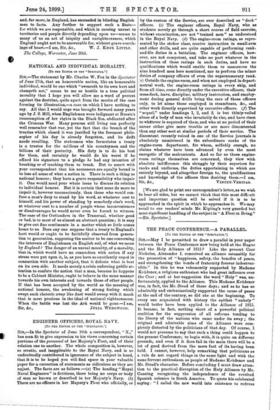NATIONAL AND INDIVIDUAL MORALITY.
[TO THE EDITOR OP THE "SPECTATOR.1
SIR,—The statement by Mr. Charles W. Fox in the Spectator of June 17th, that an honourable nation, like an honourable individual, would be one which " sweareth to its own hurt and changeth not," seems to me so hostile to a true political morality that I hope you will allow me a word of protest against the doctrine, quite apart from the merits of the case forming its illustration,—a case on which I have nothing to say. All that I would urge was brought forward many years ago by J. S. Mill, when Englishmen were indignant at Russia's reassumption of her rights in the Black Sea, abdicated after the Crimean War. Many persons still living can perfectly well remember that war, yet the fact that the breach of the treaties which closed it was justified by the foremost philo- sopher of his day is already forgotten, and its drift needs recalling. The statesman who formulates a treaty is a trustee for the millions of his countrymen and the billions of their posterity. His duty is to do his beet for them, and certainly he would do his worst if he affixed his signature to a pledge he had any intention of breaking or of teaching them to break. Bnt to assert with your correspondent that his successors are equally bound is to lose all sense of what a nation is. There is such a thing as national honour; they have a grave responsibility who impair it. One would need your whole issue to discuss its relation to individual honour. But it is certain that none do more to impair it, however unconsciously, than those who would con- fuse a man's duty to stand by his word, at whatever cost to himself, and his power of standing by somebody else's word, at whatever cost to a number of people whose inconveniences or disadvantages he would never even be forced to witness. The case of the Outlanders in the Transvaal, whether good or bad, is to most of us almost an abstract question; it is easy to give out fine sentiments in a matter which so little comes home to us. Does any one suppose that a treaty to England's hurt would or ought to be faithfully observed from genera- tion to generation, supposing the matter to be one concerning the interests of Englishmen on English soil, of what we mean by England? The danger of an unreal morality, of a morality, that is, which would have no connection with action if any stress were put upon it, is, as you have so excellently urged in connection with another subject, that it defeats what is best on its own aide. It needs merely a crisis enforcing public at- tention to confute the notion that a man, because he happens to be a Cabinet Minister, ought to behave in the same manner towards his own interests and towards those of other people. If that has been accepted by the world as the meaning of national honour, the awakening of strong feeling which swept such rhetoric away like dust would sweep with it much that is most precious in the ideal of national righteousness. When the battle was lost the Ark would be gone.—I am,


















































 Previous page
Previous page